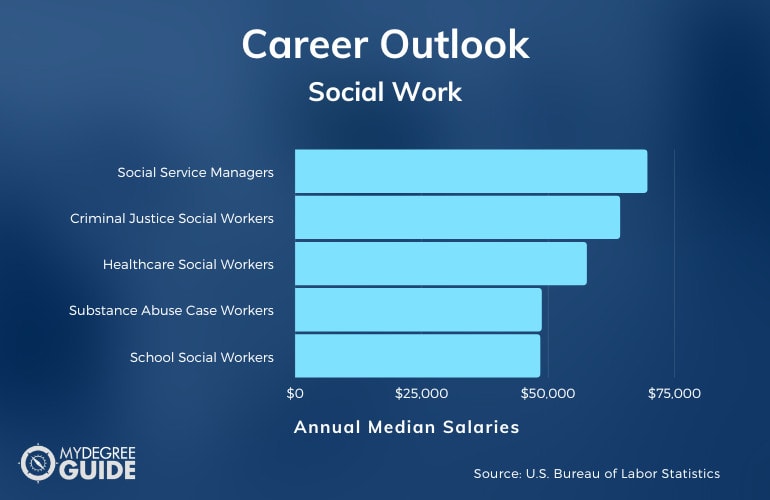Accelerated MSW programs are now easy to find by anyone who wants to specialize in helping others, and getting your master’s in social work online can help you launch your career even faster!

People who become social workers are often compassionate and understanding and care about the world and people around them.
Editorial Listing ShortCode:
A career in social work may be challenging but also extremely rewarding and satisfying. U.S. News & World Report ranked social work in its top 10 of the best social service careers.
Types of Accelerated MSW Programs
Some social work programs offer a Master of Science in Social Work, while others offer a Master of Social Work.
There may be slight variations in terms of general requirements, but they are not markedly different, and both can help prepare you for the same careers and graduate school opportunities. Most of the time, the difference is simply a naming choice by the institution.
Social work offers a wide array of specializations, each one designed to take your career in different directions. You can click on the degree you’re interested in below to jump to that section and see what it has to offer.
- MSW – General
- MSW – Advanced Clinical Social Work Practice
- MSW – Advanced Generalist Practice and Programming
- MSW – Aging
- MSW – Child, Youth, and Family
- MSW – Health
- MSW – Human Services Management
- MSW – Mental Health
- MSW – Organizational Leadership and Policy Practice
- MSW – Social Policy and Evaluation
- MSW – Substance Abuse
If you have great grades and some background experience in this field, you may qualify for online MSW programs with no GRE requirements. Since the GRE can be a barrier for some students, getting into one of these programs may be helpful.
Master’s of Social Work — General

Sometimes, becoming a master of your chosen field doesn’t necessarily entail limiting yourself to a niche field. Choosing a general concentration for your accelerated MSW program may cover all the bases you need.
It can help you build a solid foundation to work with people of all ages and social backgrounds. It can also help you develop the fundamental knowledge needed to conduct research from anthropological, economic, psychological, and sociological perspectives.
Editorial Listing ShortCode:
Accelerated online social work degree programs can be remarkably useful for those wishing to pursue careers in government, where future priorities are hard to predict but higher education is needed to advance.
Master’s of Social Work — Advanced Clinical Social Work Practice

A concentration in Advanced Clinical Practice may serve anyone who wishes to merge social causes with healthcare workers or who has prior experience helping people within a hospital setting.
This specialization can help you polish your clinical knowledge and learn how to liaise with therapists and doctors to aid them in helping their patients.
Editorial Listing ShortCode:
These programs place a special emphasis on designing and implementing viable care plans, as well as coordinating multidisciplinary interventions that can uplift an entire family.
They are often ideal for social workers who are comfortable with clinical environments, who have a passion for expanding healthcare access, or who wish to examine social initiatives from a health promotion perspective.
Master’s of Social Work — Advanced Generalist Practice and Programming

Advanced generalist practice programs take prospective professionals a step further than general programs or ones without a concentration.
They typically offer a more in-depth focus on clinical practice and project design without closing other avenues for professional development. Therefore, their curriculum offers extensive training on both clinical and macro interventions.
Editorial Listing ShortCode:
Any social work degree program can likely help a graduate learn how to change their society for the better. An Advanced Generalist Practice and Program specialization, however, can help them develop the tools needed to work with families, communities, and individuals alike.
This is a well-rounded specialization for anyone who wishes to work for non-profit companies or government agencies.
Avenues for further study are almost always still open, either through electives or a PhD program.
Master’s of Social Work — Aging

If you wish to focus your future social work career on aging and its related issues, a Master of Social Work in Aging may be the niche for you. This specialization can enable you to focus your research on the social ills that affect different age groups, in particular the elderly.
In our current demographic climate, this is one of the social work specializations that offers the biggest room for growth.
Editorial Listing ShortCode:
The curriculum for this specialization typically combines a foundation on the clinical aspects of dealing with elderly populations and a deeper understanding of the available programs and avenues for help.
These studies can help you learn how to advocate for your clients more efficiently, predicting their current needs as well as future ones.
Master’s of Social Work — Child, Youth, and Family

Many people across a variety of professions find that working with children and adolescents is especially rewarding, although also remarkably difficult. For social workers, specializing in child and youth issues offers a unique opportunity to impact future society with your everyday work.
This concentration can help you learn how to work with children from unstable environments, those who suffer from chronic illnesses, or those who were born into families where the primary caretaker is temporarily absent.
Editorial Listing ShortCode:
This avenue of work is often psychologically demanding and typically requires good teamwork skills. Those in this field of social work often coordinate different levels of care to provide children with healthy outlets, prevent future incarceration, and preserve their chances of higher education.
Master’s of Social Work — Health

One of the most sought-after avenues for professional development in this field is medical social work.
If you are interested in developing your career within a hospital group, insurance provider, or health care regulatory agency, this specialty may open countless new positions and opportunities.
In clinical settings, social workers often provide valuable support to patients dealing with catastrophic diagnoses, as well as their families. Many specialize with specific groups, such as donor recipients, chronically-ill people, home-care service coordination, or occupational health.
Editorial Listing ShortCode:
This program can teach you how to better coordinate with nurses, doctors, allied therapists, and the healthcare system itself. This requires empathetic yet assertive professionals who are comfortable around medical wards and bodily fluids.
Master’s of Social Work — Human Services Management

Many enter the social work field thinking directly of the people whose lives they can affect, but the task of maintaining the corporate structures and offices that make this work possible often gets overlooked.
For those who wish to become the enablers of social change rather than the movers and shakers themselves, a concentration in Human Services Management may be a smart choice.
Editorial Listing ShortCode:
These programs often allow students to pursue the same core courses required for a general MSW program. In addition, they typically include practical seminars on labor legislation, community organization, and social administration management.
Many programs also include special electives meant to increase success when seeking grant-based funding or writing development plans.
Master’s of Social Work — Mental Health

Completing an MSW program with a focus on mental health can help you pursue a career as a specialist psychiatric social worker. This is a relatively new profession that has quickly gained traction thanks to ongoing legislative changes and a newfound emphasis on the importance of mental health.
On a daily basis, a psychiatric social worker may help support the funding, recovery, and social reinsertion of people affected by mental health conditions.
Traditionally, this has been focused on services for major psychiatric disorders, such as schizophrenia or bipolar disorder.
Editorial Listing ShortCode:
Now, new niches are opening in this field to help patients secure funding for residential treatment or coordinate multidisciplinary care teams. There are also new positions for those wanting to work with special populations, like abuse victims, war veterans, and those in hospice care.
This may be a very rewarding field for people with a special commitment towards mental health issues or who seek to work close to the healthcare system without physical involvement.
Master’s of Social Work — Organizational Leadership and Policy Practice

Taking an accelerated MSW program focused on organizational leadership and policy practice can enable you to pursue work with communities and policymakers. In this field, you may be able to work toward improving social justice and equality across our country.
This specialization takes a step back from working on a case-by-case basis or dealing with people.
Instead, it can help you develop the tools needed to redesign the availability of social programs in your area, perfect the way aid is delivered, and implement new policies to protect vulnerable populations.
Editorial Listing ShortCode:
It can also help you develop a solid foundation in internal politics, which can be valuable knowledge if you wish to protect the well-being of the members of a large company or government organization.
Master’s of Social Work — Social Policy and Evaluation

Social workers in social policy and evaluation often devote themselves to assessing the ways social policy is implemented, typically with the hopes of adapting it and perfecting the way it’s delivered.
In our data-based society, this is now a necessary task across all fields of public administration, and social work and care agencies are no exception to this trend.
Specializing in social policy and evaluation can help you gain the knowledge and techniques needed to improve equality levels in a sustainable, efficient way. It can also help you develop the organizational skills non-profit agencies utilize to ensure each dollar is spent aiding others.
Editorial Listing ShortCode:
In addition, the basic knowledge of administration this specialization can help you develop can enable you to suggest improvements and monitor their impact at local and national levels.
Social policy and evaluation are closely linked with data analysis and public expenditure management. All three fields offer exciting opportunities for driven professionals who wish to facilitate change beyond their daily tasks.
Master’s of Social Work — Substance Abuse

A Master of Social Work in Substance Abuse degree program can help you learn the evidence-based therapeutic techniques needed to aid recovering addicts and their families.
Your role as a substance abuse social worker may allow you to coordinate funding to help people who are experiencing acute substance withdrawal or who need immediate admission to highly-supervised programs.
Editorial Listing ShortCode:
You may also help patients in their long-term recovery by providing them with the tools needed to rebuild their lives, as well as look after the needs of close family members and dependents who may also be affected.
In the wake of today’s current opiate crisis, an accelerated MSW program in social work can help empower you to make a real difference in your community. Your studies can help you learn how to minimize and control the different repercussions that substance abuse has on society.
Accelerated MSW Programs Overview

Social workers often counsel children, families, and adults during difficult times in their lives. Poverty, abuse and violence, mental health struggles, and other trials are what social workers specialize in helping others through.
A career as a social worker is likely to be stressful and demanding, but many people do not let this hinder their decision. Knowing they have the opportunity to make the world better is often reason enough to pursue social work as their degree of choice.
Because social work presents its own unique set of problems, those wanting to go into this career field typically first obtain a bachelor’s degree in social work in order to become licensed social workers.
There are also a few related degrees, like psychology degrees, which may be accepted for entry into graduate programs in social work.
A Bachelor of Social Work (BSW) is usually preferred, though.
After earning your bachelor’s degree, you can then go on to the master’s level. At this level, you’ll likely take classes such as:
- Human Behavior
- Social Policy
- Research Methods and Practices
- The Practice of Social Work
- Social Welfare
- Ethics
- Diversity and Discrimination
- Family and Children Social Work
While some bachelor’s programs in social work offer the opportunity to specialize in specific areas, like family and child studies, most focus on training students to become social workers in a variety of settings.
Your Master of Social Work program is where you’ll be most likely able to focus your interests and specialize in the area of social work you want to work in.
Editorial Listing ShortCode:
In most social work programs, the last major hurdle is hands-on experience through a fieldwork requirement. This means that you’ll be required to complete a practicum component of your degree in which you clock a certain number of hours out in the field.
Your fieldwork requirement will vary depending on your institution, program, personal interests, and your field of concentration.
You usually have to wait until the end of your program to complete this requirement. You’ll need the skills and knowledge learned through your coursework to competently navigate the field and ethically and responsibly interact with people in the community.
Work Outlook for MSW Graduates

Despite our higher-than-ever inequality rates (or perhaps precisely because of them), the labor market appears promising for people holding a Master of Social Work.
According to the Bureau of Labor Statistics, some careers in the social work field include:
| Career | Job Outlook (in 10 years) | Annual Median Salary |
| Social Service Managers | +15% | $69,600 |
| Criminal Justice Social Workers | +6% | $64,210 |
| Healthcare Social Workers | +13% | $57,630 |
| Substance Abuse Case Workers | +15% | $48,720 |
| School Social Workers | +13% | $48,430 |
The exact figures vary depending on the specialty you choose, the state you work in, and the years of experience you have, but the overall trend appears to be positive. Most professions related to social work appear to be expanding and typically provide solid middle-class earnings.
Social Work Licensure

It’s important to note that not all programs will prepare you for social work licensure and that each state has its own set of requirements to become licensed. Most states will only allow you to apply for licensure if you’ve obtained your degree from an accredited institution.
The required accreditation agency varies by state, so it is important to make sure to research the requirements for the state you plan to work in.
Some of them, require national accreditation, such as by the Council on Social Work Education, while some require regional accreditation, such as by the Southern Association of Colleges and Schools.
Many states give options for accrediting agencies. Not every state issues licensure for social workers who have completed only a bachelor’s degree in social work. Some states only issue licensure if a master’s or doctoral degree has been earned in social work.
In some instances, a state will grant a provisional license to someone with a bachelor’s degree as long as that person is enrolled in a master’s program and plans to pursue graduate studies in the field.
To become a licensed social worker (LSW), there are multiple steps. Most states require a background or criminal check and fingerprinting. This is essential because of the extent to which many social workers communicate with and counsel children.
An application with a fee usually has to be submitted well in advance of sitting for a required exam. Applicants must apply to a state-specific board in order to sit for the test.
You should be prepared to pay a hefty fee for the test ($200+) and a small fee (around $25) to apply for licensure. In many cases, the test can be taken while still completing your degree.
More advanced licensure may also be granted if additional requirements are met. To become a licensed clinical social worker (LCSW), applicants must meet the minimum course and field hour requirements. Another exam will have to be applied for and passed before this license is granted and additional fees apply.
It can’t be stressed enough that requirements vary state by state, so it’s essential that you research each state you plan to practice in to determine your best plan of action.
Why Earn your MSW through an Online Accelerated Program?

Acquiring a master’s in social work may provide you with a significant boost in your career, both where job opportunities and salaries are involved. This doesn’t erase the fact that any master’s program is a significant investment, though.
Besides tuition, there are costs attached to the opportunity (or the hours not worked while pursuing the degree), as well as to commuting, textbooks, and even relocation expenses if you live away from school.
People pursuing an online-based accelerated program have a legs-up when it comes to facing the initial price tag. On average, online programs tend to be cheaper than in-person ones.
Naturally, this is rapidly changing, as the prestige offered by online MSW programs can now easily match traditional ones. Nevertheless, an online degree will offer you the opportunity to continue living and working where you are.
This can be especially helpful if you are pursuing a degree at a city-based school, where living costs tend to be significantly higher.
Online programs also tend to offer more flexibility when it comes to scheduling. The ability to take classes and study from home, even at late hours of the night, is especially valuable if you are a shift worker or have pre-existing family obligations.
This is why long-distance programs are often considered a great equalizer of opportunities, especially for adult or non-traditional learners.
Accreditation for Accelerated Online Master’s of Social Work Programs

Whenever an industry expands quickly, it becomes significantly harder for the average consumer to know exactly what they’re buying. Education is no exception to this.
One of the best ways to ensure an educational program will provide you with competitive, evidence-based knowledge is to check its accreditation. This is a process done by a third-party organization that is meant to ensure that an academic institution meets certain minimum quality standards.
For a Master of Social Work program, there are two main types of accreditation you ought to look for:
Regional Accreditation
Historically, regional accreditation has been the go-to process followed by top-rated schools around the country.
Many regional agencies, such as the Higher Learning Commission, offer its schools simplified processes for credit transfers. Employers across almost every industry in the United States tend to look for regional accreditation first.
The Council on Social Work Education
This is a nationwide organization that specializes in quality control for social work programs. It encompasses over 750 programs, at both the bachelor’s and master’s levels.
Because they are recognized as specialists, many non-profit companies and government agencies rely on the CSWE when hiring social workers specifically.
Financial Aid for MSW Students

You can start your search for financial aid in the same place you started when earning your undergrad: the Free Application for Federal Student Aid (FAFSA). You may still qualify for grants and loans from the government.
You can also explore the following avenues:
State Funding
Though typically less than the federal government offers, it can be worth looking into funds your state has set aside to help residents earn a higher education.
Private Scholarships
Although fewer, master’s level scholarships also tend to attract less competition.
For social work programs, there are several options that cater to specific populations, such as African Americans or Latinos, or to people pursuing specific career paths. The National Association of Social Workers and the Paul & Daisy Soros Fellowships both offer such scholarships.
Regional Societies for Clinical Social Work
In certain states, such as California and Colorado, the local Societies for Clinical Social Work offer bursaries and grants to prospective students. Each one has different standards and requirements before applying.
You can also ask your employer if they’d be willing to sponsor you in getting your MSW.
What Is an MSW Program?

An MSW, or Master of Social Work, is a graduate-level course of study that is meant to prepare students to work independently as social workers, caseworkers, or counselors.
It may also provide a start for those who are interested in conducting research or pursuing a career in academia. Most PhD programs in social work require prior completion of an MSW.
How Long Is an MSW Program?
Just like most programs at the master’s degree level, a standard MSW program is designed to take approximately 2 years to complete. This usually encompasses between 60 and 90 credit hours.
Some programs also require a certain number of clinical practice hours.
The time required to complete an MSW may vary depending on the student and the type of program. A full-time student enrolled in an accelerated program may be able to complete it in a year, or three semesters, especially if they have been awarded credits for work experience.
Part-time programs may take 3 to 6 years to complete.
Which MSW Program Is the Best?
It is very hard to determine an absolute-best program because it depends on your needs and interests. It is typically best, though, to look for programs that have received accreditation from the Council on Social Work Education. This accreditation ensures that the education you will receive is up to the highest standards.
Is MSW a Good Degree?

Yes, an MSW is a good degree for many students wishing to work in the field of social work.
A Master of Social Work is rarely the choice for those who want to enter a fast-track towards riches. If you are a justice-minded person who wants to help people around your community or have a lifelong passion for caring and transforming lives, an MSW program may be your best bet, though.
While we rarely need a fancy degree to be kind or to help others, an MSW degree can help provide you with the knowledge and connections needed to make a lasting impact.
Whether you want to provide holistic care to vulnerable senior citizens or redesign the available services for at-risk children at the state level, an MSW can help give you the skills needed to drive your own change.

